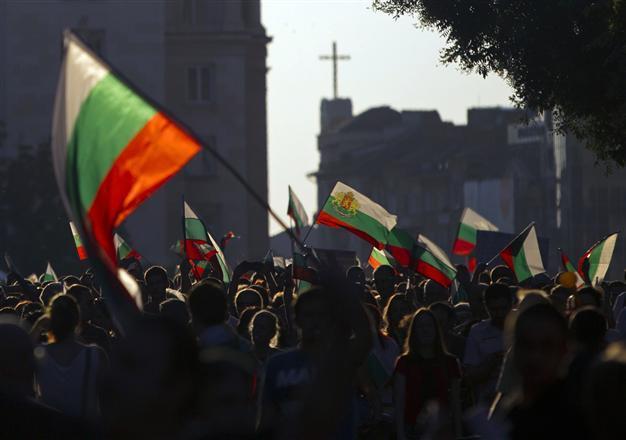Bulgaria anti-government pressure persists after violence
SOFIA - Agence France-Presse

A protester waves the national flag during an anti-government demonstration in front of the parliament building in Sofia July 24. REUTERS photo
New rallies in Bulgaria on July 24 increased pressure on the embattled government to resign, a day after violence flared in the EU's poorest country as demonstrators trapped lawmakers inside parliament for hours.
More than 4,000 demonstrators marched along Sofia's boulevards for a 41st straight evening, waving white, green and red national flags and shouting "Mafia!" and "Resign!" outside the parliament building, encircled by metal fencing and a tight police cordon.
Violence flared outside the building Tuesday night when riot police clashed with some 2,000 protesters who besieged parliament and prevented 109 ministers, MPs, journalists and others from leaving it for more than seven hours.
At least 20 people - including five policemen - were injured during a police attempt to escort the officials out in a bus as stones were hurled at the vehicle, smashing several windows and forcing it to turn back, an AFP reporter said.
Police finally used shields and batons to disperse the crowd shortly before daybreak, while heavy machinery moved in to tear down makeshift barricades of park benches, garbage containers and paving stones.
Protests have been held in the capital every evening since June 14 by thousands of people fed up with cronyism and corruption who are calling for the resignation of the new government -- which took office less than two months ago.
The rallies had begun peacefully and the demonstrators pledged on July 23 to refrain from violence after an appeal for restraint to both protesters and police by President Rosen Plevneliev.
"After so many days and no response from the government but just insolence and arrogance, I feared that things would get out of hand at some point even if nobody wanted that," 72-year-old painter Ani Ralcheva told AFP as she waved a small EU flag outside parliament on Wednesday.
"We must continue the rallies - peacefully but staunchly - and not give up and I hope things end in a civilised way," she added.
"I strongly hope that they got the message by now and will resign soon," said 33-year-old bank clerk Maria Angelova, who pushed her two toddlers in a pram.
'Ugly scenes'The president's powers are limited but he would be responsible for appointing a caretaker administration and calling new elections should the beleaguered Socialist-backed minority government of Prime Minister Plamen Oresharski throw in the towel.
The new cabinet has only been in office since snap elections on May 12.
Anti-poverty rallies last winter had seen eight people set themselves on fire, six of whom died, forcing the rightwing administration of tough-guy premier Boyko Borisov to resign in February.
Stern technocrat Oresharski has so far resisted demands to step down and call yet another round of elections, saying it would exacerbate the crisis and further damage the fragile economy.
Socialist leader Sergey Stanishev condemned "the ugly scenes" and urged the authorities to punish the instigators of the violence as well as ensure the normal functioning of parliament, which cancelled its session July 23.
"Parliamentarians were not elected to work under ultimatums and pressure," parliamentary speaker Mihail Mikov fumed but vowed the legislature would convene again on Thursday to debate a 2013 budget revision.
Public anger - initially sparked by a controversial security chief appointment - has snowballed into wider discontent against the whole political class, criticised as corrupt and beholden to oligarchs who pull the strings behind the scenes.
